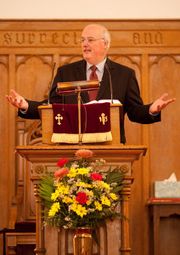Westminster Difference: Practical Theology
September 12, 2010

...preach the word; be ready in season and out of season; reprove, rebuke, and exhort, with complete patience and teaching. For the time is coming when people will not endure sound teaching...As for you, always be sober-minded, endure suffering, do the work of an evangelist, fulfill your ministry.
2 Timothy 4:2-3a, 5 (ESV)
The Department of Practical Theology exists to apply biblical exegesis and theology in the formation of godly and competent practitioners who can minister God’s unchanging Word to our changing world.
"Where is your own need for courage in life and in ministry? Relationships within your family as you live the lordship of Jesus? Consequences among friends or colleagues as you live the culture of Christ's kingdom in the kingdom of the world? Be courageous in your Christian life and ministry, because God has prepared us for bodily resurrection and guaranteed it to us by the Spirit!"
John Currie, "Preaching By Faith, Not by Sight" Resurrection and Eschatology, p. 564
Below is an excerpt transcribed from a Convocation message, "The Great Commission," by Dr. Richard B. Gaffin, Jr. in 1998. To hear the convocation address, click here
It's understandable, surely, that generations of the church have been drawn to these verses at the end of Matthew's Gospel, chapter 28, verses 19 and 20, and called them the Great Commission. It's understandable because there the task before the church is clear and unmistakable.
It's fair to say that the church has been most captured by the challenge of the Great Commission, especially the largeness of the challenge, the sheer magnitude of the task in view there. The "all"s (the "pantas" in the Greek text) are quite pronounced. "Disciple all nations," Jesus says; "teach everything I have commanded." So, you see, we have a challenge here that is both extensive and intensive, as comprehensive as it is universal.
Evidently, then, there are many aspects to the challenge laid out before us in the Great Commission. So I should remind us, in fact assure us, at the outset that our work here at Westminster does not fall within the scope of the Great Commission. As some of you will know, there's a difference of viewpoint about this. It could be pointed out, as we've been assuming all along here in our comments that the Great Commission is given to the church. Specifically, it's given first to the apostles, as the foundation of the church, and, after them, to those in every generation of the church until Jesus comes that are set apart to baptize and to teach. So the question would come, "How does what we do at Westminster relate to this activity of discipling the nations?"
 That's an interesting question. It's an important question. But let's not let it sidetrack us this morning. Let's just content ourselves, and be confident, in saying at least this, that though Westminster is not the church, Westminster undeniably exists for the sake of the Great Commission. The evidence for that is right at hand this morning in this auditorium--in the flags from so many nations on the walls, and more importantly, in the makeup of who we are as a group. Concretely, we can see here in our midst how the Great Commission has been fulfilled and is being fulfilled in its universal scope, how the nations have been and are being discipled.
That's an interesting question. It's an important question. But let's not let it sidetrack us this morning. Let's just content ourselves, and be confident, in saying at least this, that though Westminster is not the church, Westminster undeniably exists for the sake of the Great Commission. The evidence for that is right at hand this morning in this auditorium--in the flags from so many nations on the walls, and more importantly, in the makeup of who we are as a group. Concretely, we can see here in our midst how the Great Commission has been fulfilled and is being fulfilled in its universal scope, how the nations have been and are being discipled.









 That's an interesting question. It's an important question. But let's not let it sidetrack us this morning. Let's just content ourselves, and be confident, in saying at least this, that though Westminster is not the church, Westminster undeniably exists for the sake of the Great Commission. The evidence for that is right at hand this morning in this auditorium--in the flags from so many nations on the walls, and more importantly, in the makeup of who we are as a group. Concretely, we can see here in our midst how the Great Commission has been fulfilled and is being fulfilled in its universal scope, how the nations have been and are being discipled.
That's an interesting question. It's an important question. But let's not let it sidetrack us this morning. Let's just content ourselves, and be confident, in saying at least this, that though Westminster is not the church, Westminster undeniably exists for the sake of the Great Commission. The evidence for that is right at hand this morning in this auditorium--in the flags from so many nations on the walls, and more importantly, in the makeup of who we are as a group. Concretely, we can see here in our midst how the Great Commission has been fulfilled and is being fulfilled in its universal scope, how the nations have been and are being discipled.